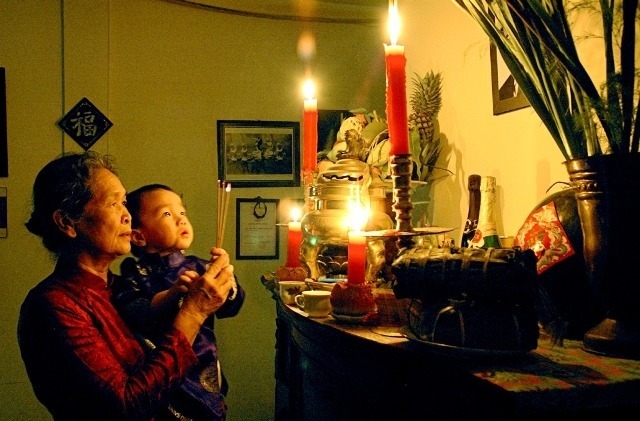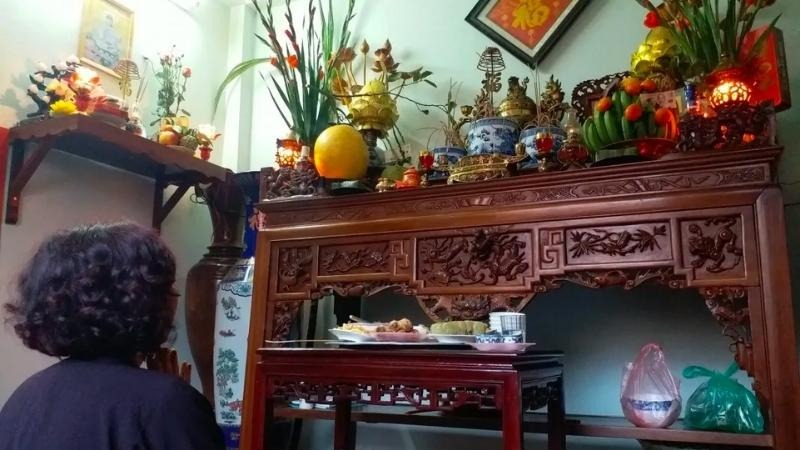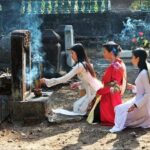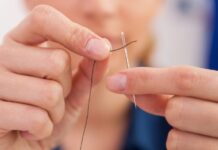Ancestral Worship: Honoring Family Traditions
Ancestral Worship Ceremony
The tradition of ancestral worship is special and sacred, with a unique ritual. The altar must be fully set up and offerings presented before anyone can partake in the feast. If the head of the family is not available to perform the ceremony, the prepared food must be set aside for the ritual.
Just as when our elders are still with us, we would not dare eat before them; the same respect is given to our ancestors. During the ceremony, reverence is of utmost importance. “Thoughts in the mind are understood by the gods,” so any disrespectful thoughts during the ritual are considered unfilial, and our ancestors will not bear witness to such disrespect.
Ancestral Worship for Sons-in-Law and Daughters-in-Law
All significant family events, from joys to sorrows, must be shared with our ancestors. During the wedding ceremony of a child, it is customary for not only the head of the family but also the participants to perform ancestral worship.
Before the groom leaves to fetch his bride, he must perform the ritual at his family altar and then at his in-laws’ altar, as well as at the respective family temples.

The bride follows a similar process. Before leaving her parental home, she performs the ritual at her family altar, and upon arriving at her husband’s home, she does the same at his family altar. Afterward, the groom’s family will take her to visit the temples of both their paternal and maternal ancestors.
These rituals are performed for the couple to pay their respects to their new ancestors and for the ancestors to recognize the new addition to the family. It is a way to introduce the new son-in-law or daughter-in-law to the ancestors and for them to be accepted as part of the family.
Taboo of Calling Ancestors’ Names
In our tradition, it is customary to avoid calling our elders by their names. If we must refer to them in daily conversation, we use alternative words or synonyms. For example, “Ha Dong” becomes “Ha Duong,” “dong” (frozen) becomes “dac” (solid), “flower” becomes “bloom,” “grapefruit” becomes “pomelo,” and “ball” becomes “sphere,” and so on.

This taboo is even more strictly observed for our departed ancestors. If one is called by the name of a deceased elder, it is considered a grave insult and may invoke deep anger. To avoid offending our ancestors, we are always mindful of our behavior and strive to avoid any conflicts.
During ancestral worship, when it is necessary to call upon their names, the head of the family does so very softly, out of respect and fear of committing a disrespectful act by speaking too loudly.
Younger generations are not supposed to know the names of their ancestors to avoid any unintentional disrespect to their parents. When naming a child, parents refrain from using the names of their ancestors. While this practice is no longer common in big cities, it is still maintained in many rural areas.
The Ancestors’ Advice: Who Are the Three People Who Shouldn’t Visit the Graves, According to Tradition, for the Family’s Prosperity?
In the world of Feng Shui, there are certain taboos to be aware of when it comes to grave-sweeping. It is said that the presence of these three individuals can bring about misfortune and bad luck. So, who are these people, and why are they considered inauspicious? Find out and ensure you take the necessary precautions!




































